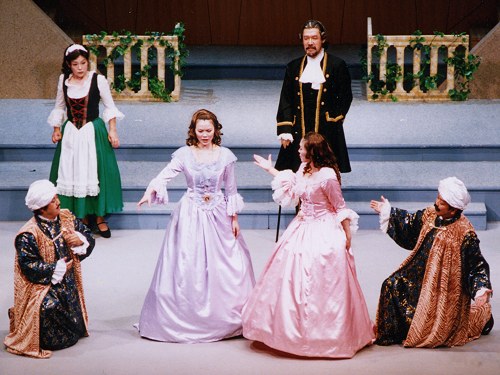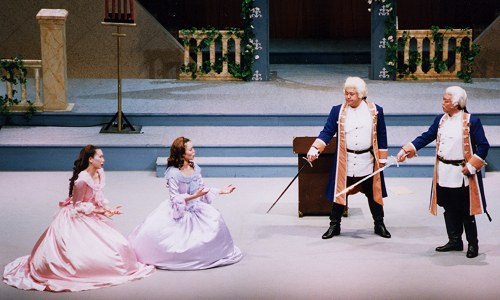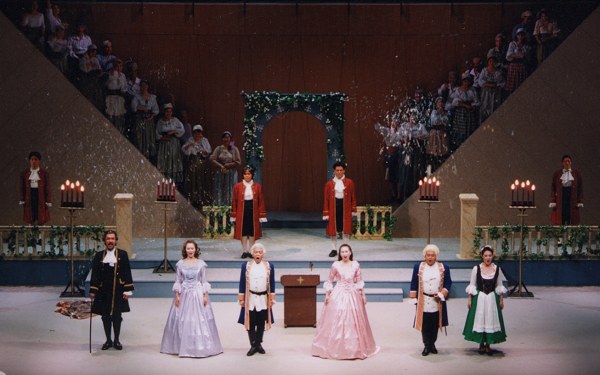In Italian this year
Cosí fan tutte
A year gone by already from the highly successful and enjoyable Carmen (May 2000). Work and other preoccupations delayed my contact with the group this year, but I was delighted to find that, with a later date than last year, I could still manage the first rehearsal meeting.

Our heros in disguise
And this year, Mozart: a very different idiom and style. To be honest, Mozart isn't my favourite end of the opera spectrum: I find the dramatic pace simply too stiff and slow. But it's Mozart's music, so as music, either to perform or listen to it's wonderful. There are arias of course, but the particular strength of Mozart's comic operas is the ensembles, sparingly spiced with the chorus. Unfortunately for the chorus, "sparing" really is the word - the chorus is only in view once in the whole opera, with three other bits of behind-the-scenes singing.
While the chorus participation is small-scale, there are a total of six principals, which with a lot of ensemble work means the parts are all fairly strenuous. Compared with an all-out effort for Carmen last year, this was a low-key affair: a piano (plus harpsichord) in place of the orchestra, and two of the female solo parts were split, different singers taking Act 1 and Act 2. In the end I think it went off well, both on subjective impressions and on a bums-on-seats basis: the hall was pleasingly full.
Singing in Italian
This year the problem of translation was avoided by singing the original Italian. Leaving only the problem of learning to pronounce it. Of course Italian must surely be the easiest language in the world to sing in, but there are the problems of an unfamiliar spelling system for a start. I had assumed I'd be able to explain it all, but rapidly realised that the 20th century Italian I once learned was very different from Da Ponte's Italian of a couple of centuries before. One or two bits I never managed to parse, even.
But in Italian, can the audience follow? Perhaps not, but there were subtitles, and the plot is pretty simple - actually rather silly, in an operatic sort of way, and a hint of where W S Gilbert's ideas came from. Two sisters, and two boys in love with them; two foils, Don Alfonso (old philosopher, whatever that is, exactly), and Despina the maid, who plot to show the boy just how fickle the girls are. That's the title Cosí fan tutte: "Thus do all [feminine plural]." So the boys fake going off to a jolly bit of war (standard Mozart martial chorus off stage), then reappear "disguised" as Albanians. Of course the girls fall (in an extremely implausible manner) for their new suitors, unintentionally swapping over. They get as far as a pantomime wedding - the chorus appearance - when the return of the "original" lovers is heralded by a reprise of the martial chorus. Shock, horror, stuff like that, reconciliation, and happy ending somehow. And Da Ponte, like Gilbert, was being topical: I hadn't realised quite how early Mr Mesmer's magnetism (for curing faked illness) had appeared on the scene, but it was just a few years before Cosí was written.
(For anyone less familiar with English comic opera, Sir W S Gilbert was the wit who wrote the words to go with Sir Arthur Sullivan's music in the series of operettas from the late 1800s that bears their names.)

Threatened retribution...
Back to the singing pronunciation: it wasn't bad, I thought. Invariably the most obvious difficulty is nothing to do with L's and R's - while singing teachers endlessly stress that consonants are more important, I suspect this means that the timing of consonants is crucial. Their precise quality isn't so important, whereas vowels are around long enough for infelicities to be more obvious. The five Japanese vowels, 'a' - 'i' - 'u' - 'e' - 'o', map to the Italian five in an obvious way, but the big problem is 'u'. The Japanese vowel is completely unrounded, so instead of the pure 'oooo' of Italian, it's a rather flat sound. Actually, for practical purposes nothing is rounded in Japanese: this is why it's one of the few languages that can (literally!) be spoken while maintaining a fixed grin, a fact that you can see demonstrated regularly on TV. This is why the very hardest English words for Japanese speakers are things with lots of W's in, followed by a "u" sound - "Woolworths" for example. Japanese has a 'w', but only followed by 'a', which can be achieved by opening the mouth like a letterbox. But "Woolworths" inevitably involves widening the lips from 'w' to 'u', and is totally impossible with a letterbox.
Iwafune Cosmos Hall
As part of the downscaling from last year, the production moved from the 1300-seat municipal multipurpose hall in Oyama to Iwafune, a small town between Sano and Oyama, where the 600-700 seat Cosmos Hall was opened in the early 1990s. Not to get too far off the musical subject, suffice it to say that one effect of the Japanese economic bubble was the seemingly limitless expansion of public works projects, and this is a spectacular example - quite a piece of architecture for a town of 20,000 inhabitants.
Although it has a sloping auditorium floor, it resembles less a conventional concert hall, than one of those old aristocratic ballrooms of Eastern Europe, with an overall box shape, a narrow gallery on both sides and behind the stage, and ornate no-expense-spared columns reaching to the ceiling. Acoustically it is wonderful, but in most other respects it's hard to believe it was designed for its current purpose. The seating is idiosyncratic, with a single row of diagonally facing seats around the gallery, and two rows high above the back of the stage, with a strange twin staircase leading up from the back of the stage. There is a curtain, but no proscenium arch (so backstage "leaks" round the gallery) and the green room area is totally inadequate; we (the chorus) were left to creep behind the gymnasium to the old community hall used as changing quarters.
As for the action: for the principals this took place on stage (in the usual way). But there was nowhere to hide the chorus for the off-stage bits, and we ended up seated in these two rows at the back of the stage throughout the performance (a long time to sit still). For the single "on-stage" appearance, we filed down and stood on the staircases, then returned until the curtain call. Amazingly tiring for one of the most minimalist bits of acting ever conceived, yet it was wonderful to have acoustics so that we could hear ourselves singing.
Land of the sinking yen
A bit of a niggle, I'm afraid: the cost of it all. Professional opera is notoriously the most expensive art form of all time, and amateur opera isn't that far behind, it seems. But a number of things don't quite seem to add up. To sing in the chorus, the "membership fee" this year was 10,000 yen - roughly 100 USD/EUR, or 60 pounds. (Last year for Carmen it was two or three times that.) I counted the notes in the bass chorus part: 441 in the whole opera, meaning it cost me some 22 yen per note performed. Two of the cast this year were guest professionals, who receive a fee for their appearances, as seems entirely reasonable. I suppose the rationale behind all this is the usual exaggerated reliance on the professional/amateur distinction - amateurs are pupils, who pay, professionals are sensei, who get paid. And yet, while one can happily accept a bunch of people on the stage, some getting paid, some not, the idea that (essentially) some are paying the others really is a bit hard to swallow. In the end, of course, this causes a real problem, in that there are people who would like to make a contribution by singing, but who simply can't afford to!
(At the time of writing (end August), I've just sung in the Sano Ninth Chorus summer concert (also as it happens in Iwafune Cosmos Hall). I got roped in at the last moment - I had been planning to "rest" this year, at least partly because of the cost, another 15,000 yen (£100!) a year.)
The Japanese perception is that the situation here is very difficult because there is none of the state sponsorship of Europe nor the big corporate sponsorship of America, but I suspect this takes an excessively rosy view of the situation "over there".

Finale: the chorus, strung out on the notorious Cosmos Hall staircase,
provide an impromptu shower of confetti